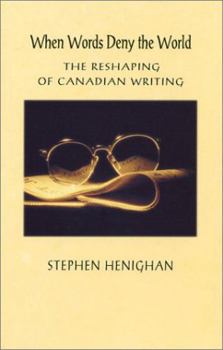When Words Deny the World
'It's the liveliest, most cogently argued, most provocative and most infuriatingly self-satisfied work of literary criticism to be published in this country in at least the last decade.' This description may be from another edition of this product.
Format:Paperback
Language:English
ISBN:088984240X
ISBN13:9780889842403
Release Date:March 2002
Publisher:Porcupine's Quill
Length:211 Pages
Weight:0.83 lbs.
Dimensions:0.8" x 5.5" x 8.8"
Customer Reviews
1 rating
Irreverent iconoclast
Published by Thriftbooks.com User , 22 years ago
Henighan's assault on the icons of the Canadian literary scene is essential reading for anyone. All that's required to enjoy this book is a detached view of what constitutes "literature." Hollywood and other hype forms have elevated such figures as Timothy Findley, Carole Shields and Michael Ondaatje to elevated status. Is the adulation warranted? In most cases, according to Henighan, the answer is an emphatic negative. These essays, derived from his reviews of literary growth in Canada over two decades, reflect a strong historical awareness. Canada, "endowed by history . . . with the literary language of the world's two most powerful empires, the British and the American," was shedding its British roots just when the American "elephant" came to dominate the literary scene. For Henighan, a sound historical context is fundamental to producing in-depth literature. In Canada, that history was swamped by those imperial intimidations. Canadian writing is thus constrained, with its literature, just gaining an identity, being flooded by market requirements.Market became the dominant force as Canadian writing was beset by commercial ideals. Writers falsified history to capture sales. In the finest analytical piece in this collection, Henighan dissects two key works of the "transition" period: Michael Ondaatje's "The English Patient" and Ann Michaels' "Fugitive Pieces." Henighan finds both clarity and obfuscation in Ondaatje's work - "at his best, his prose is unbeatable." Henighan faults Ondaatje for transforming history into metaphor. Historians object to authors projecting modern values into the past. Ondaatje commits this sin repeatedly, "neutering the past into harmless, ecstatic visions," according to Henighan. Using fiction as the medium is no excuse, according to Henighan, since this technique leads the reader into false views of history's lessons. Michaels falls into the same trap by "anesthetising the Holocaust." He finds "most of Fugitive Pieces is shapeless showing-off.... The reader's role here, is "to make you impressed with yourself for having read" the book. Not a compelling reason for taking it up.In the same essay, however, Henighan depicts Jack Hodgins "Broken Ground" as a "deliberate inversion of The English Patient." He contends Hodgins is "sparring" with Ondaatje with his frighteningly realistic portrayal of trench warfare in WWI. This comparison surely diminishes Hodgins' writing skills. Hodgins is purely his own man as a writer, hardly needing Ondaatje as a foil. It's surprising that in his later expose of the Giller and Governor General's awards Henighan overlooks the great injustice done Hodgins over this outstanding work. This oversight is one of Henighan's few serious lapses, since he credits it as Hodgins' most exceptional book. Canada's role in literature was hampered in the 90s by the rise of "neo-conservatism" typified by a public seeking "traditional values," particularly in family matters. Carole






